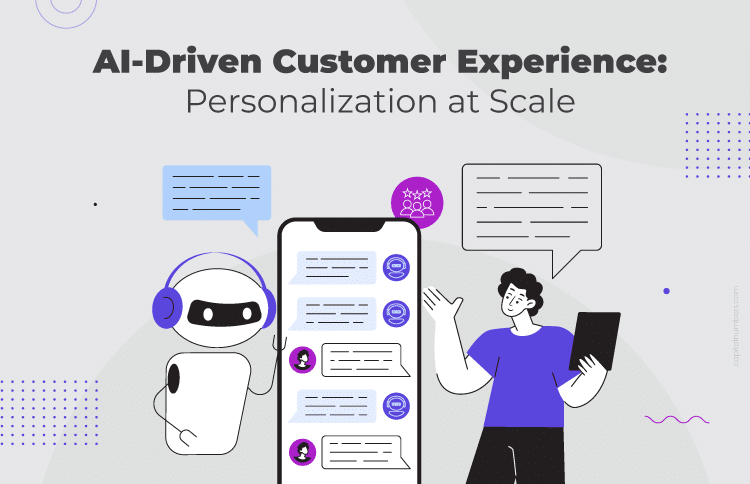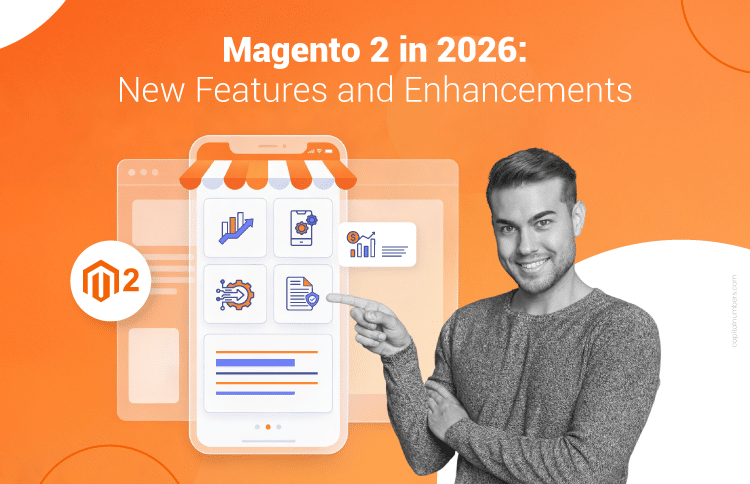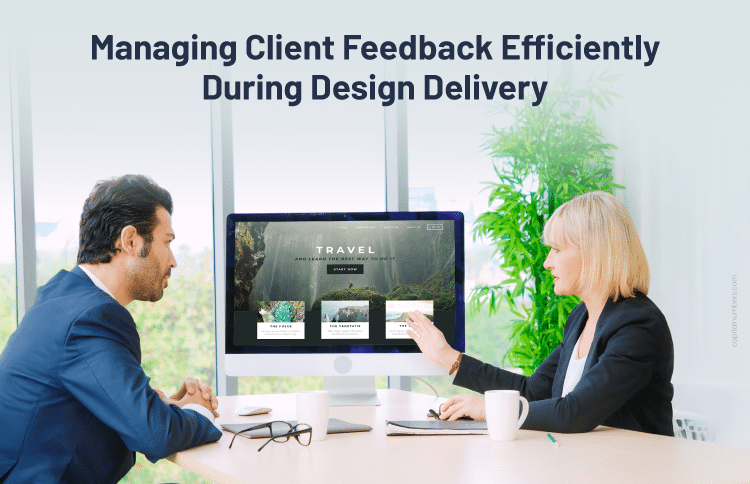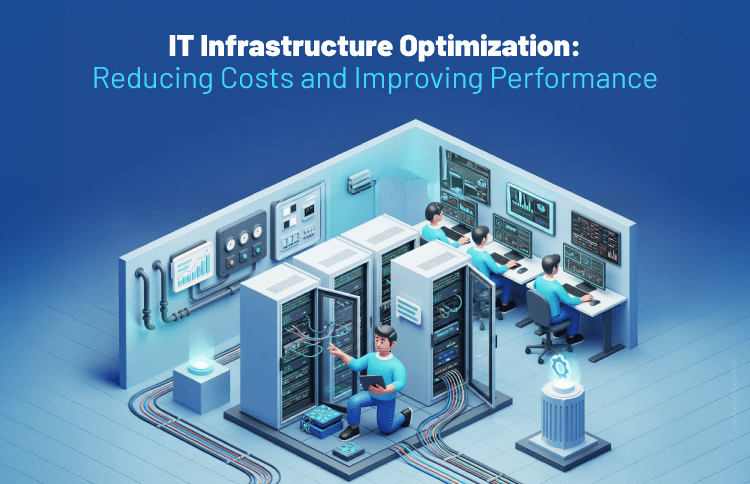AI-Driven Customer Experience: Personalization at Scale
Table of Contents
In today’s fast-moving market, customers expect more than just good service – they want experiences that feel tailored to them. For businesses, this means finding smarter, faster ways to connect with individuals on a personal level. Enter Artificial Intelligence (AI). From personalized product suggestions to virtual assistants that know your preferences, AI is changing how companies engage with their customers – and doing it at scale.
How Personalization Has Evolved
Not long ago, customer personalization meant grouping people by age, location, or shopping history. It worked – to a point. But these broad categories couldn’t always meet the changing needs and rising expectations of modern consumers.
AI has changed the game. By analyzing large amounts of data in real time, it can deliver insights that help businesses understand what customers want – sometimes even before they know it themselves. Through tools like machine learning, natural language processing, and predictive analytics, brands can now create more meaningful and responsive interactions.
Real-Life Examples of AI in Action
1. Sephora – Virtual Try-Ons and Smart Chatbots
Sephora is using AI to make beauty shopping more fun and personal. With the Virtual Artist app, shoppers can see how makeup will look on their face using augmented reality. Meanwhile, AI chatbots offer product recommendations based on skin tone, preferences, and past purchases – making the experience both high-tech and highly personalized.
2. Domino’s – Ordering Made Effortless
Ordering a pizza has never been easier. Domino’s uses AI-powered chatbots on platforms like Facebook Messenger to let customers place and customize orders. These bots remember your favorite items, making repeat orders quick and convenient – all while improving customer satisfaction and streamlining operations.
3. Bank of America – Meet Erica
Erica, Bank of America’s AI assistant, helps users manage their money more wisely. Whether it’s checking balances, tracking spending habits, or offering budgeting tips, Erica delivers personal financial insights by analyzing customer data – creating a smarter, more intuitive banking experience.
4. Spotify – Music That Matches Your Mood
Spotify uses AI to curate playlists and suggest music tailored to each user’s taste. By looking at your listening history, skipped tracks, and favorite genres, the app serves up music that feels handpicked – keeping users engaged and coming back for more.
5. Disney – Genie+ for Smarter Theme Park Visits
With Disney’s Genie+ service, park-goers get a personalized itinerary that helps them get the most out of their day. The system uses AI to track real-time data like ride wait times and visitor preferences, ensuring a smoother and more enjoyable park experience.
6. Starbucks – Deep Brew Behind the Scenes
Starbucks has built an AI system called Deep Brew, which powers features like personalized drink suggestions and loyalty reward management. Based on your order history and tastes, the app helps you discover new favorites – while also making the ordering process faster and more efficient.
7. L’Oréal – Beauty Tech at Your Fingertips
L’Oréal is bringing AI into the world of skincare and cosmetics. Using technology developed with Nvidia, the brand’s systems can suggest products based on skin type, preferences, and previous purchases. It’s a tech-driven solution that still feels personal.
8. Klarna – A Chatbot with Personality
Klarna, the Swedish fintech firm, took a bold step by launching an AI chatbot modeled after its CEO. Available via hotline in the U.S. and Sweden, this bot can help customers while offering a glimpse into the company’s unique approach to AI. Importantly, Klarna emphasizes that not all roles can (or should) be automated – a reminder of the value of the human touch.
You May Also Read: Magento and AI: Personalizing the Customer Experience
Why AI-Powered Personalization Works
AI brings a lot to the table when it comes to customer experience:
- Scalability: AI can handle data from thousands – or millions – of customers at once, without losing the personal touch.
- Efficiency: Routine tasks like answering FAQs or processing orders can be automated, freeing up human teams to focus on more complex interactions.
- Real-Time Feedback: AI systems can analyze customer behavior as it happens, allowing businesses to adjust strategies or offers on the fly.
- Stronger Customer Relationships: Personalized recommendations, timely support, and helpful insights all contribute to higher customer satisfaction and loyalty.
- Cost Savings: Personalization at scale through AI reduces the need for large customer service teams, lowering operational costs while maintaining (or even improving) service quality.
- Enhanced Engagement: AI-driven personalization keeps customers engaged by showing them relevant content, offers, and messages that align with their unique interests and behavior.
- Data-Driven Decision Making: With constant data input, AI helps businesses make informed decisions quickly, refining marketing strategies and product offerings based on what’s truly working.
- Predictive Insights: By analyzing patterns in past behavior, AI can anticipate customer needs before they arise, allowing businesses to proactively offer solutions or products.
- Dynamic Content Delivery: AI can tailor website or app content in real-time based on a user’s browsing history, location, or even time of day, creating a more relevant and engaging experience.
- Improved Customer Retention: Personalized experiences make customers feel understood and valued, which increases repeat visits and long-term loyalty.
- A/B Testing at Scale: AI can run and analyze multiple variations of marketing campaigns simultaneously, identifying which personalized messages or layouts perform best – faster than human teams ever could.
You May Also Read: AI in Mobile Apps: Top Use Cases and Benefits for Businesses
But There Are Challenges, Too
Despite its promise, AI-driven personalization isn’t without hurdles:
- Privacy and Data Protection: With great data comes great responsibility. Businesses must safeguard personal information and comply with privacy regulations.
- Algorithmic Bias: If AI is trained on biased data, it can produce unfair or skewed results. Ongoing monitoring and inclusive data sets are essential.
- Integration Complexity: Adding AI tools to existing systems can be tricky. Seamless integration with CRMs, databases, and support platforms is key.
- The Human Element: AI is powerful, but it can’t replace human empathy. For complex or emotional issues, people still want to talk to other people.
- Scalability and Real-Time Processing: Personalizing at scale – especially in real-time – can be technically demanding. It requires high-performance systems that can handle large volumes of data and respond instantly.
- Cold Start Problem: For new users or products with limited interaction history, the AI may lack sufficient data to deliver accurate personalization – leading to generic or off-target experiences.
- Interpretability and Explainability: Many AI systems are black boxes. Understanding and explaining why an AI made a particular recommendation or decision is essential, especially in regulated industries like finance or healthcare.
Ready to Deliver Hyper-Personalized Customer Experiences?
Leverage our AI development expertise to build intelligent systems that understand, predict, and adapt to your customers – at scale. Let’s build smarter applications.
Looking Ahead: The Future of AI in CX
The role of AI in customer experience is only going to grow. With technologies like natural language processing and predictive analytics advancing rapidly, businesses will be able to deliver even more intuitive and proactive support. However, success will depend on doing AI the right way – being transparent, ethical, and always putting the customer first.
Final Thoughts
AI-powered personalization isn’t some far-off idea – it’s already here, and it’s changing how companies connect with people every day. When done thoughtfully, it allows businesses to meet customers where they are, with exactly what they need – creating experiences that are not just efficient, but memorable. The future of customer experience is personal, and with AI, it’s scalable, too.


















